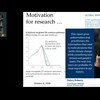awell
Well-being and population ethics
Workshop on well-being and population ethics. Part of the project ‘Valuing future lives’ (‘Att värdera framtida liv’), funded by the Swedish Research Council (‘Vetenskapsrådet’). Venue: The Institute f
Being and Well-Being
in: Weighing and Reasoning. Themes from the Philosophy of John Broome, Eds.Iwao Hirose and Andrew Reisner, Oxford University Press. This chapter discusses the question of whether we can make it better
How do we measure well-being?
Stella lives with her family in a villa in a medium-sized town in Sweden. She likes her job but her back is hurting. How do we measure her well-being? Increasing well-being is generally accepted as one
Extended Preferences and Interpersonal Comparisons of Well‐being
Philosophy and Phenomenological Research. Published online 7 November 2016. doi.org/10.1111/phpr.12334 Abstract An important objection to preference‐satisfaction theories of well‐being is that these the
Axiological Retributivism and the Desert Neutrality Paradox
Campbell, T. Axiological Retributivism and the Desert Neutrality Paradox. Philosophies 2022, 7, 80. https://doi.org/10.3390/philosophies7040080 Abstract: According to axiological retributivism, people canan outcome in which someone gets what she deserves, even if it is bad for her, can thereby haveintrinsic positive value. A question seldom asked is how axiological retributivism should deal withcomparisons of outcomes that differ with respect to the number and identities of deserving agents.Attempting to answer this question exposes a problem for axiological retributivism that parallels awell-known problem in population axiology introduced by John Broome. The problem for axiologicalretributivism is that it supports the existence of a range of negative wellbeing levels such that if adeserving person comes into existence at any of these levels, the resulting outcome is neither betternor worse with respect to desert. However, the existence of such a range is inconsistent with a setof very plausible axiological claims. I call this the desert neutrality paradox. After introducing theparadox, I consider several possible responses to it. I suggest that one reasonable response, thoughperhaps not the only one, is to reject axiological retributivism.

Liberal nationalism
David Miller, Gina Gustavsson and Yael Tamir, discusses with Philippe van Parijs and moderator Lars Anell. Gustaf Arrhenius and Bengt Westerberg introduce the subject.
Friendship trust and psychological well-being from late adolescence to early adulthood: A structural equation modelling approach
Scandinavian Journal of Public Health, Volume: 45 issue:3, pp.244-252. doi.org/10.1177/1403494816680784 Abstract Aims:This study explored the sex-specific associations between friendship trust and the p: The findings suggest that young people do not benefit from trustful social relations to the same extent as adult populations. Young women who express impaired well-being run a greater risk of being members of networks characterized by low friendship trust over time.

Julia Steinberger: Is it possible to live well within planetary limits? Evidence and modelling from the LiLi project
Professor Julia Steinberger researches and teaches in the interdisciplinary areas of Ecological Economics and Industrial Ecology. Her research examines the connections between resource use (energy and
Julia Steinberger: Is it possible to live well within planetary limits? Evidence and modelling from the LiLi project
Professor Julia Steinbergerresearches and teaches in the interdisciplinary areas of Ecological Economics and Industrial Ecology. Her research examines the connections between resource use (energy and
Changes in young adults' mental well-being before and during the early stage of the COVID-10 pandemic: disparities between ethnic groups in Germany
Child and Adolescent Psychiatry and Mental Health 15:69 (2021) Abstract The COVID-19 pandemic resulted in substantial disruptions to the daily lives of young people. Yet knowledge is lacking about change = 25). Respondents provided information on mental well-being (psychosomatic complaints, anxiety, depression, life satisfaction) and exposure to pandemic-related stressors (financial worries, health worries, discrimination, contact with COVID-19). Responses on mental well-being were matched to responses from two pre-pandemic waves.








